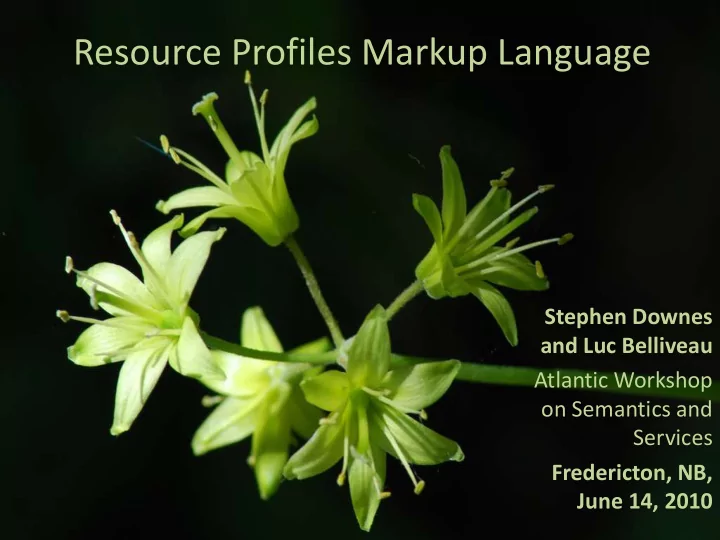

Resource Profiles Markup Language Stephen Downes and Luc Belliveau Atlantic Workshop on Semantics and Services Fredericton, NB, June 14, 2010
Overview • Resource Profiles – Distributed Metadata – Three Types of Metadata – Educational Metadata – Using Resource Profiles • Resource Profiles Markup Language – RPML Tool Demo – RPML Syntax Overview – RPML Application Detail
Distributed Metadata • One Document, One Record? • Distributed Metadata: – Multiple Metadata Formats – Multiple Authorship – Multiple Locations
Three Types of Metadata • First Party Metadata – Bibliographic, technical, rights • Second Party Metadata – Page rank, usage metadata, server logs, context • Third Party Metadata – Classification, ratings, educational
Educational Metadata • Educational Standards Metadata – Matches a resource to an educational standard – Curriculum, course description, competencies • Educational Properties Metadata – interactivity type, learning resource type, interactivity level, semantic density • Educational Use Metadata – Relation, sequencing, learning design
Using Resource Profiles • Static vs Evolving Resource Description • Tailoring of Profile to Specific Needs • Resource Metadata Lifecycle • The RPML engine selects elements from different files and combines them to form new, and possibly unique, descriptions of a given resource
RPML Engine Demo
RPML Engine Demo
RPML Syntax Overview Getting Results <directive> <ruleset> <rule test=”/dc/title”> <add- result name=”title” select=”/dc/title” /> </rule> <rule test=”/ lom /general/title”> <add- result name=”title” select=”/ lom /general/title” /> </rule> </ruleset>
RPML Syntax Overview 2 Using Results <evaluate> <true> <for- each result=”title” select=”node()”> <element name=”title”> <value- of select=”text()” /> </element> </for-each> </true> <false> <!-- none of the rules matched --!></false> </evaluate> </directive>
RPML App Flow XML Inputs Xpath - <inputs> - <document> <text> Extracted PDF </text> <uri> file:///{$appPath}/examples/inputPdfExtracted.xml </ uri> </document> - <document> <text> OAI Dublin Core </text> <uri> file:///{$appPath}/examples/inputOaiDc.xml </uri> </document> </inputs> </rpmlTool>
RPML App Flow XML 2 Outputs XSLT - <outputs> - <document> <text> Learning Object Metadata (IEEE) </text> <uri> file:///{$appPath}/examples/outputLom.xml </uri > </document> - <document> <text> Dublin Core </text> <uri> file:///{$appPath}/examples/outputDc.xml </uri> </document> </outputs>
RPML XSLT Rule – Relation Construction of Output File - <rpml:first-resource match=" rule "> - <rpml:rule test=" /oai_dc:dc/dc:relation "> <rpml:set-value mode=" relation " select=" /oai_dc:dc/dc:relation " /> </rpml:rule> - <rpml:element name=" relation "> <rpml:get-value mode=" relation " select=" text() " /> </rpml:element> </rpml:first-resource>
RPML PHP1 // Include OAI DC Metadata, a yes/no value and PdfExtract metadata. $resources = array( pathinfo('file:///'.$_SERVER['SCRIPT_FILENAME'], PATHINFO_DIRNAME) .'/data/IvS7/md_1', pathinfo('file:///'.$_SERVER['SCRIPT_FILENAME'], PATHINFO_DIRNAME) .'/data/IvS7/md_2', pathinfo('file:///'.$_SERVER['SCRIPT_FILENAME'], PATHINFO_DIRNAME) .'/data/IvS7/md_3' ); // Instantiate the RPML processor $rpml = new rpml($resources); // Output resulting XML file. echo $rpml->getOutput();
RPML PHP2 $selectedDoc = new DOMDocument(); $xslDoc = new DOMDocument(); $xsl = new XSLTProcessor(); $selectedDoc->load(pathinfo.../profile/example.xml'); $xslDoc->load(pathinfo... .'/inc/rpml.xsl'); $xsl->importStylesheet($xslDoc); $resources = implode(',', $this->resources); $xsl->setParameter('', 'resources', $resources); $data = ''; $data = $xsl->transformToXml($selectedDoc);
Thanks! Stephen Downes stephen@downes.ca Luc Belliveau Luc.Belliveau@nrc-cnrc.gc.ca
Recommend
More recommend